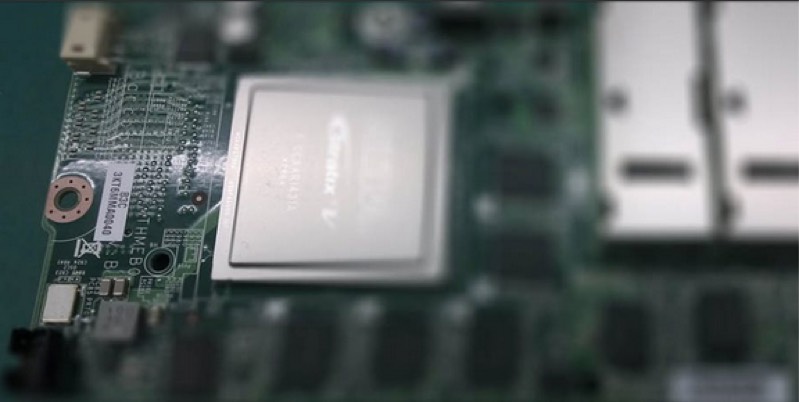 NEWS
NEWS
 NEWS
NEWS
 NEWS
NEWS
Microsoft Corp. is diving deeper into the chip business in hopes of boosting its prospects in artificial intelligence.
The software giant is continuing its development of field-programmable gate arrays (FPGAs) to improve performance and provide new capabilities in the data center that started back in 2011 under the name of Project Catapult. The company displayed its latest FPGA at its annual Ignite Conference Monday, demonstrating what it called “the first artificial intelligence (AI) supercomputer.”
According to Wired, which was given exclusive access to the technology by Microsoft, the new FPGAs already underpin Bing search, and in the coming weeks will be used to drive new search algorithms based on deep neural networks, that is artificial intelligence modeled on the structure of the human brain, and will be able to execute AI in several orders of magnitude faster than ordinary chips are able to do.
Microsoft researcher Doug Burger explained in the story that the programmable chips give Microsoft “massive capacity and enormous flexibility, and the economics work. This is now Microsoft’s standard, worldwide architecture.”
“What that means is you get the efficiency of hardware but you also get flexibility because you can change their functionality on the fly,” Burger added. “This new architecture that we’ve built effectively (put) an FPGA-based AI supercomputer into our global, hyperscale cloud. We get awesome speed, scale and efficiency. It will change what’s possible for AI.”
The FPGAs used in a data center not only seriously accelerate performance, they also have the ability to reduce power consumption delivering substantial savings. In on example, a Catapult FPGA enabled server was able to double the throughput of Bing’s search result ranking with less than a 30 percent increase in cost.
FPGA’s themselves have been around for decades, but they were primarily used for prototyping of non-programmable chips before now.
The advantages of using a FPGA chip over a standard chip is that because they are programmable, they can be customized to handle new challenges when it comes to changing technology and business models, versus a traditional chip that is built for a specific purpose. As Learnbonds points out, the Catapult architecture delivers the efficiency and performance of custom hardware without the cost, complexity and risk of deploying fully customized ASICs into the datacenter.
Although the core of the research has been done by Microsoft the Catapult FPGA’s are being made by Altera Corp., a company acquired for a whopping $16.7 billion by Intel Corp. in December 2015. While some questioned that acquisition at the time, given that Microsoft has seemingly overcome many of the hurdles to make the chips competitive and cheap, the buy makes a lot more sense nine months on for Intel.
Intel Executive Vice President Diane Bryant told Wired that she expects FPGAs to appear in a third of all servers inside all the major cloud computing companies by 2020.
Support our mission to keep content open and free by engaging with theCUBE community. Join theCUBE’s Alumni Trust Network, where technology leaders connect, share intelligence and create opportunities.
Founded by tech visionaries John Furrier and Dave Vellante, SiliconANGLE Media has built a dynamic ecosystem of industry-leading digital media brands that reach 15+ million elite tech professionals. Our new proprietary theCUBE AI Video Cloud is breaking ground in audience interaction, leveraging theCUBEai.com neural network to help technology companies make data-driven decisions and stay at the forefront of industry conversations.